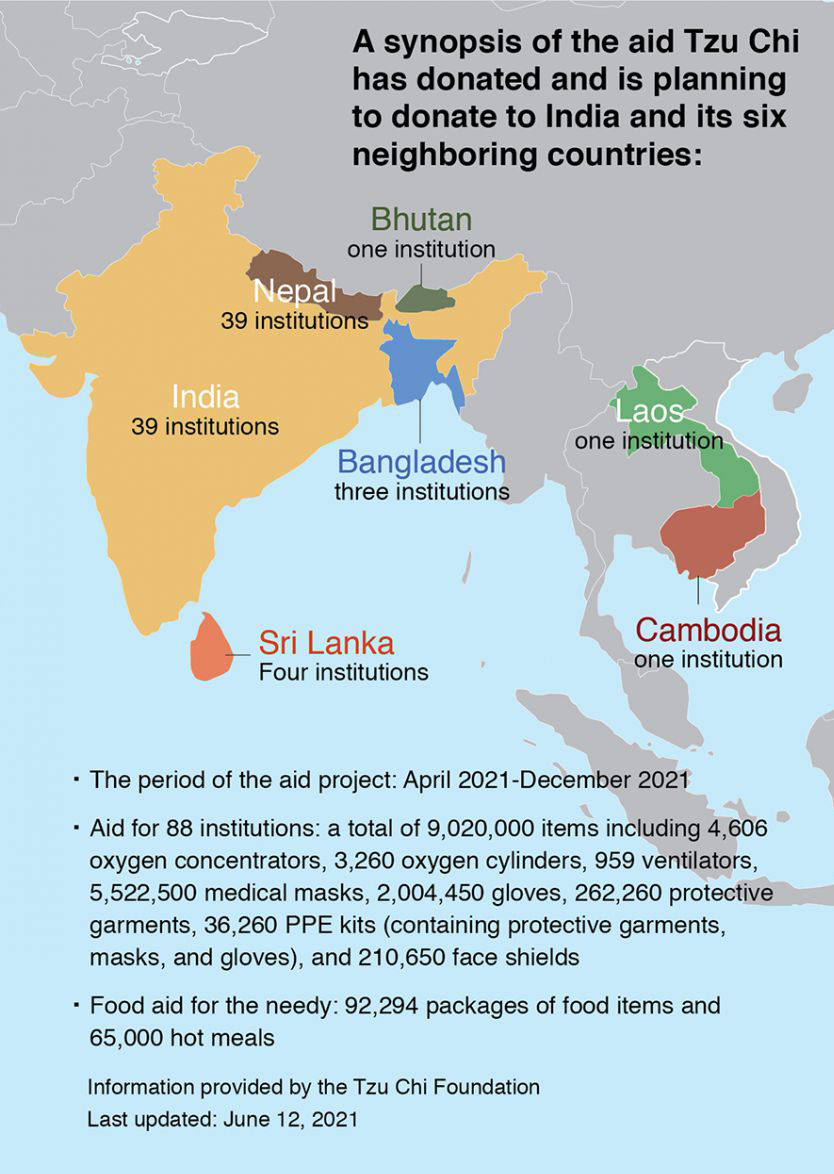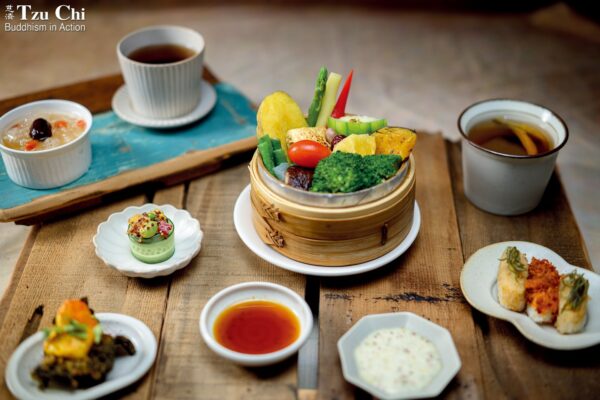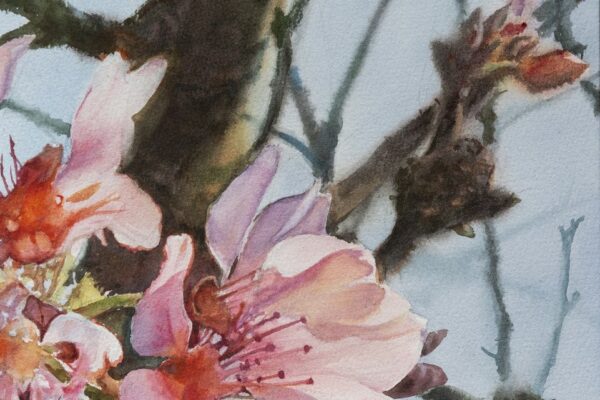By Yeh Tzu-hao
Compiled and translated by Wu Hsiao-ting
Photos courtesy of Tzu Chi Hualien headquarters
India, with a population of over 1.3 billion people, has been one of the world’s hardest hit areas during the pandemic. The South Asian country recorded nine million coronavirus infections in May 2021 alone. Medical institutions were overwhelmed by the sudden surge of patients needing care as COVID-19 spiraled out of control, which resulted in a staggering death toll. Here is how Tzu Chi reached out to help.
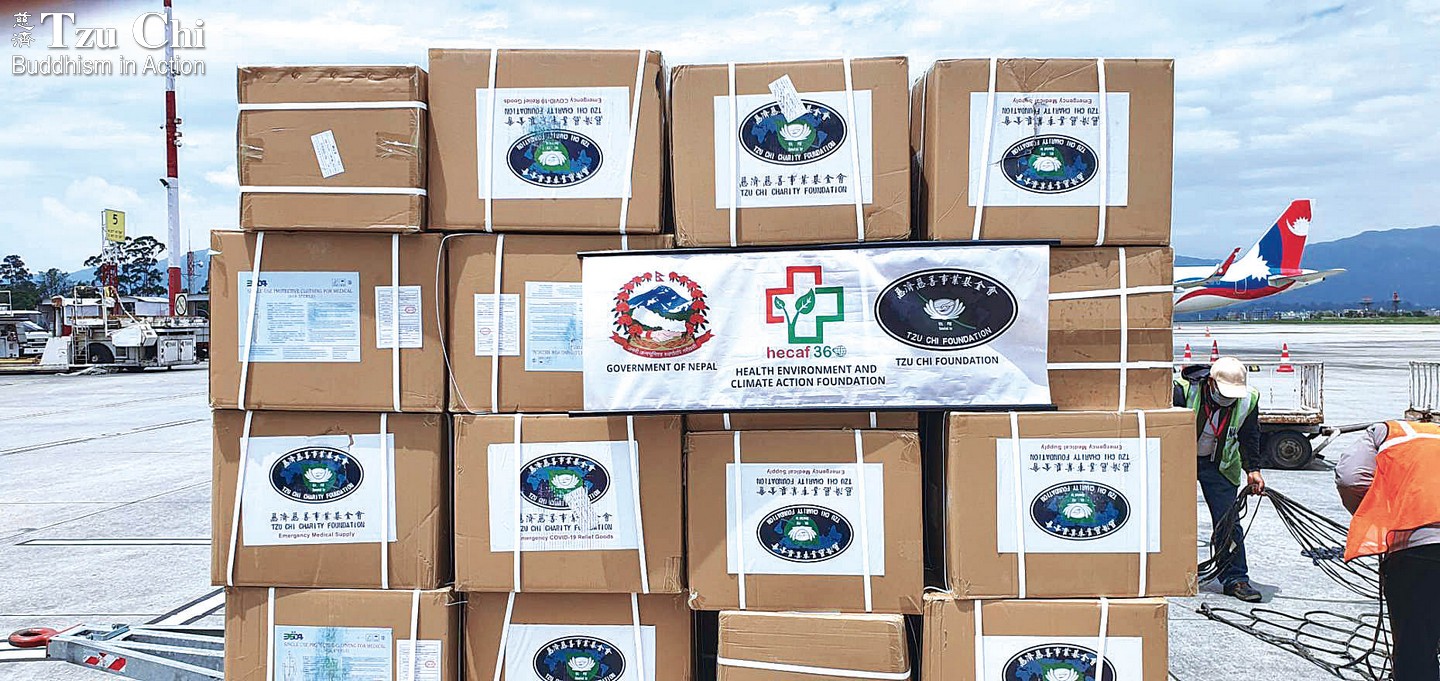
PPE donated by Tzu Chi arrived in Kathmandu, Nepal, at the end of May 2021.
COVID-19 vaccines started to be approved for use at the end of 2020, bringing hope to a world reeling from the disease. There finally seemed to be light at the end of a long, dark tunnel. Months later, however, instead of a decline in confirmed cases, the global COVID-19 rates hit a level even higher than the peak in 2020. The main reason was the runaway outbreak of the disease in India.
According to an official tally by the Indian government, the country recorded more than nine million diagnosed cases and nearly 120,000 deaths in May 2021 alone. At its highest, there were more than 400,000 infections and 4,000 deaths per day. India’s second coronavirus wave hit the nation like an unstoppable tsunami.
With an insidious new variant complicating matters, the nation’s medical system collapsed in April. New Delhi, Mumbai, Kolkata, and other major cities became hotspots for the disease. Over 1.3 billion people faced a collective crisis as the infection ravaged the country. The country’s crisis spread far beyond its borders, impacting the global community as well.
India is the world’s largest producer of COVID vaccines, and the main supplier to COVAX, a worldwide initiative aimed at equitable access to COVID vaccines. But as the coronavirus pandemic grew out of hand in India, the government began to restrict vaccine exports to satisfy domestic demand, resulting in delivery delays to other countries. As the world struggled to overcome the coronavirus, the crisis in India could not be overlooked.
In view of the situation and based on humanitarian and compassionate considerations, the Tzu Chi Foundation sped up its efforts to combat the disease by providing life-saving medical supplies and equipment to India and neighboring countries, including Nepal, Sri Lanka, Cambodia, Bangladesh, Bhutan, and Laos.
Urgent need for oxygen
“We have been admitting an average of 250 to 300 suspected COVID-19 patients per day. Of those, about 150 have had to be moved into the intensive care unit. However, only about 30 people are discharged from the hospital every day. The load on our medical capacity is huge. We currently need oxygen concentrators the most.”
Those words were from Prof. Lt. Col. Dr. A. Ravikumar, when he appealed to Tzu Chi for help via videoconferencing earlier this year. Ravikumar is the Pro-Vice Chancellor of SRM Medical College Hospital and Research Centre in Kattankulathur, Tamil Nadu, India. He was describing the severe need for medical oxygen driven by the spike in COVID-19 cases. Due to the critical shortages of oxygen, many people in India were spending large sums of money buying oxygen on the black market, even though such sources were dubious. Those too poor to afford it could only watch helplessly as their family members died in pain. It was heart-wrenching to see one sad scene after another of people losing their loved ones to the coronavirus.
In response to the urgent need, Tzu Chi jumped into action to provide oxygen concentrators, oxygen cylinders, ventilators, and other equipment to 88 religious, charitable, and medical institutions in India and six neighboring countries. The foundation is also planning to donate ten liquid oxygen storage tanks for hospitals to use.
Because patients suffering from respiratory failure can die in a few minutes for lack of oxygen, hospitals must be able to provide an endless supply of oxygen to their patients to save lives. That’s why they need equipment like the oxygen storage tanks. The tanks store low-temperature, liquefied oxygen, which, after processing, is delivered via pipeline to hospital wards for use. The purchase of such equipment requires specialized knowledge. Fortunately, the Tzu Chi team in charge of the purchase and transportation of the equipment has been able to enlist the help of Dr. Lin Chin-lon (林俊龍), CEO of the Tzu Chi medical mission.
“We are also very grateful for the help of Mr. Hou Zhe-hong [侯哲宏], of Kaohsiung, [southern Taiwan],” said Huang Jing En (黃靜恩), a Tzu Chi staffer who helps organize the foundation’s aid to India. “He provided 600 47-liter [12.4-gallon] oxygen cylinders to us. Thanks also to volunteers Pan Ji-li [潘機利] and Huang Jian-zhong [黃建忠], also of Kaohsiung, for connecting us with Mr. Hou and helping make some arrangements.” Huang Jing En explained that the foundation received a request in early May from the International Buddhist Confederation in India for 2,000 oxygen cylinders to help meet the need in India. When Hou learned about it, he promptly worked to obtain as many oxygen cylinders as he could for Tzu Chi to help save lives. Hou deals in a variety of merchandise, including medical equipment and supplies.
Hou was eventually able to obtain 600 oxygen cylinders. He and his employees started working overtime in mid-May to inspect the equipment and get it ready for shipment. Their hard work paid off. Everything was loaded for shipping on May 24 and sailed for New Delhi in early June. Everyone was worn out by the time they were done with the task, but they were full of joy for being able to help and contribute.
Tzu Chi staffers and volunteers worked equally hard to obtain oxygen concentrators for India. By the end of May, one thousand concentrators donated by the foundation had arrived in the nation. Of those one thousand machines, 200 were delivered to Mumbai, and collected by Tzu Chi volunteer Pravin Bhalesain. Twenty of those 200 concentrators were provided to the Missionaries of Charity, 80 to Sneha Charitable Trust, and one hundred to ABM Samaj Prabodhan Sanstha. ABM, a Buddhist non-profit, held a prayer service after receiving the donation from Tzu Chi in the hope that Buddhism could give everyone more strength. The aforementioned Pravin Bhalesain, a member of this non-profit, also called upon local Buddhists and entrepreneurs to eat vegetarian.
Another local Tzu Chi volunteer, Girish Shenoy, of Bengaluru, Karnataka, received ten concentrators donated by the foundation. When India’s second coronavirus wave broke out this year, he purchased oxygen containers out-of-pocket, filled them at oxygen filling stations, then provided the oxygen free-of-charge to impoverished COVID patients. When he received the ten concentrators from Tzu Chi in early June, he immediately used the machines and a donated generator to set up an oxygen filling station to help more people. “I’m so happy to see our local volunteers stepping up to the plate during this difficult time,” said Simon Shyong (熊士民), deputy CEO of the Tzu Chi charity mission.
Another two hundred of the one thousand oxygen concentrators were delivered to Tamil Nadu. The donation was enthusiastically received by the local government and people. The members of the social elite who worked with Tzu Chi on the project promised to deliver the machines to needy hospitals. “Though they are not Tzu Chi volunteers, they decided to work with us when they learned what Master Cheng Yen and Tzu Chi do,” Huang Jing En said.
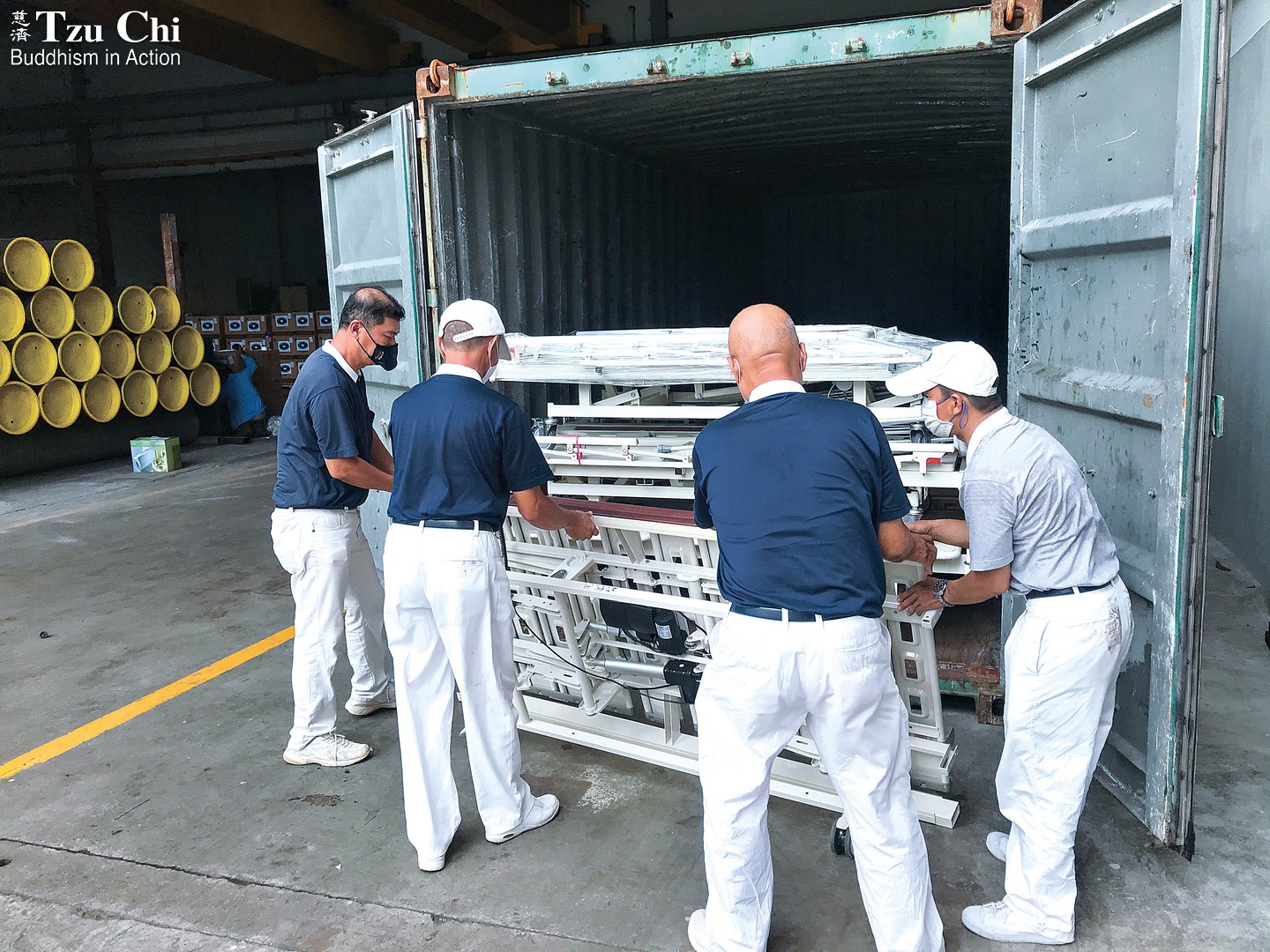
Volunteers in Singapore load medical supplies donated by Tzu Chi into a shipping container to be transported to Cambodia. Volunteers in China, Indonesia, Malaysia, and Singapore have been helping the foundation purchase necessary equipment and supplies and arranging for them to be transported to India and six other countries.
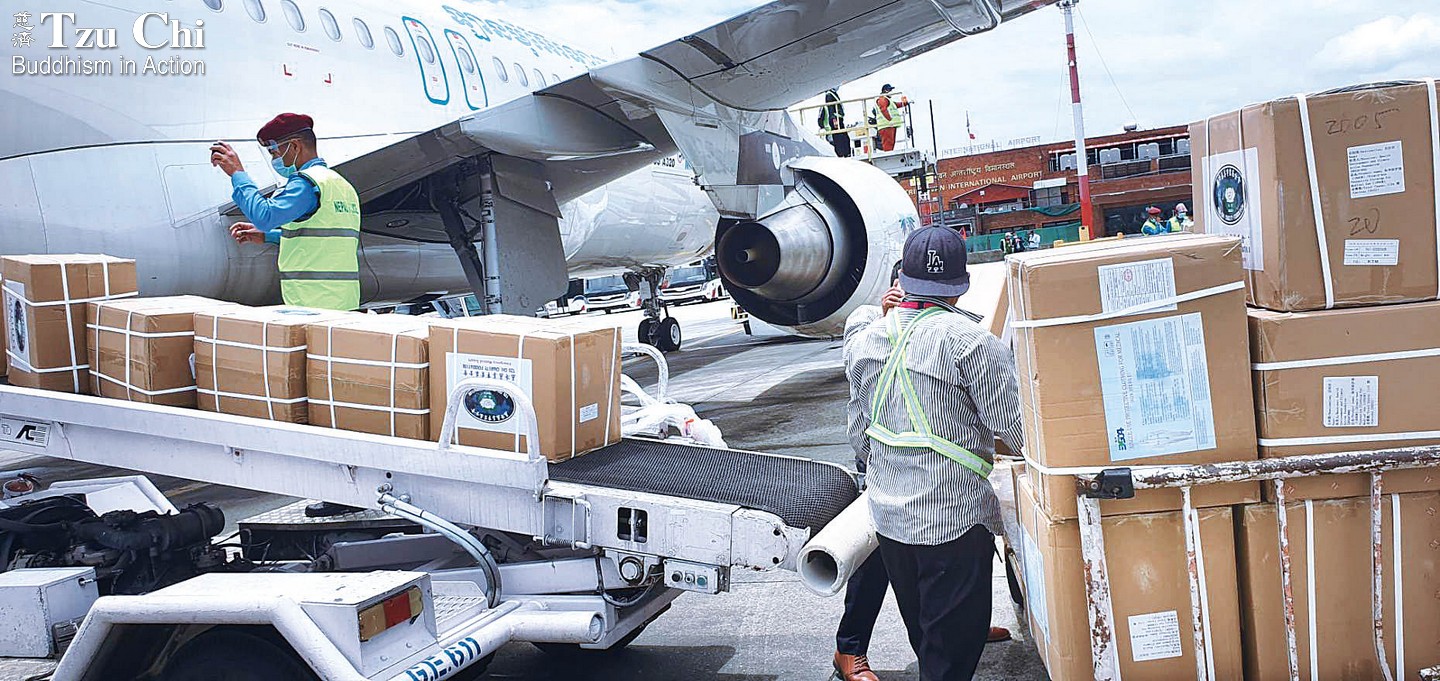
When a shipment of Tzu Chi-supplied medical items arrived at an airport in Nepal in late May, the government gave local volunteers special permission to clear customs on-site.
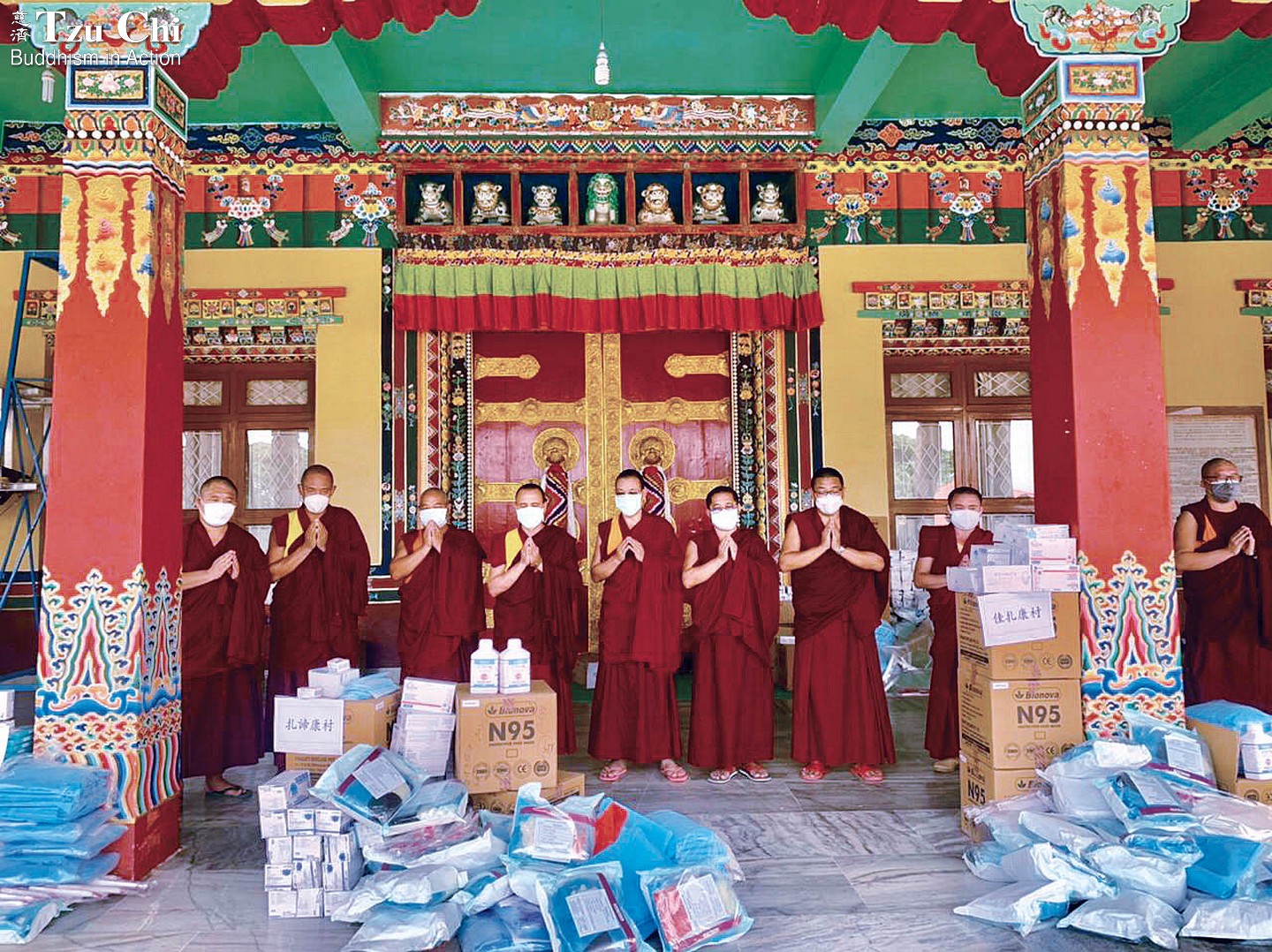
Since the pandemic broke out, Sera Jey Monastery in southern India has helped Tzu Chi distribute aid to local needy people. When the foundation learned earlier this year that the monastery was in dire need of protective equipment to fight COVID-19, they sent items such as protective clothing, disinfectant spray, anti-bacterial gloves and masks, and oximeters to the monastery. The items arrived in mid-May.
Volunteering to care for the sick
Tzu Chi’s COVID aid to India started as early as April 2020. Lockdowns were implemented in the country in March and were extended again and again, devastating the livelihoods of countless people, especially those who lived from hand to mouth. In response, Tzu Chi started working with the Missionaries of Charity, the Camillians (a Roman Catholic missionary order based in Italy), and Tibetan Buddhist monasteries in India to provide aid to local vulnerable people. Thanks to the help of these organizations, the foundation’s aid has been able to reach areas Tzu Chi volunteers haven’t been able to visit personally.
The aid goods donated by Tzu Chi included rice, cooking oil, salt, and other food, as well as personal protective equipment (PPE), such as masks. By April 2021, Tzu Chi’s partners in India had distributed 190,000 food packages to the needy, each enough to last a recipient household for a month.
After India’s second wave of COVID-19 erupted in April this year, local destitute people found themselves worse off than last year. Disregarding the risk of infection to themselves, many priests and nuns from the organizations that worked with Tzu Chi helped the poor in the streets every day or served the sick at medical facilities.
“With the pandemic so severe, why do you still insist on going out into the streets to give?” Tzu Chi staffers asked nuns from the Missionaries of Charity. Their answer was deeply moving: “If we don’t help the poor, who else will? We must do all we can. If the worst should happen to us and our lives end, we’ll simply return to the Lord’s side. But as long as we are still breathing, we’ll make the best of every day by giving to hurting and suffering people.”
Similarly, members of the Camillians were doing their best to help during this trying time. Like the nuns from the Missionaries of Charity, they were ready to sacrifice their lives to help the less fortunate. In late April, the first group of Camillian priests and nuns donned Tzu Chi-supplied PPE and ventured into hospitals packed with COVID-19 patients. There they provided help and support to front-line medical personnel. They fed patients, cleaned up after them, and even helped dispose of the bodies of the deceased.
“They all underwent rigorous training before they could go into hospitals to serve,” Huang Jing En explained. “They even had to submit a written affidavit stating that their decision to serve in the hospital was theirs alone.” Huang felt for and worried about the safety of these priests, nuns, and youth volunteers who willingly chose to serve patients in such difficult environments. Dharma Master Cheng Yen was just as concerned when she learned that the priests and nuns were prepared to “never make it out.” She said in a choked voice, “No, we mustn’t let the worst happen to them. Each of them must come out safe and sound.”
On May 17, the Tzu Chi headquarters in Hualien, Taiwan, received the happy news that the 40 priests, nuns, and volunteers who went into two Catholic hospitals to serve had safely completed their three-week service period. A second group of Camillian members would take over and volunteer in three Catholic hospitals in the next phase. Though by early June a few of these clergy members had been diagnosed with the coronavirus, they were all eventually able to recover and return home. Father Baby Ellickal, M.I., head of the Camillians in India, said in a message to Tzu Chi that he felt nothing but gratitude and appreciation for the cross-religious help provided by the foundation. He thanked Master Cheng Yen and Tzu Chi volunteers for their continuous support for the Camillians in India. He promised that he and his fellow brothers and sisters would do their absolute best to never let the Master and Tzu Chi volunteers down.
Speaking of the Camillians and the other Tzu Chi partners in India, Master De Chen (德宸) of the Jing Si Abode relayed a message from Master Cheng Yen. She said that the Master had stressed the necessity of providing enough protective equipment for all those working on the front lines. It was imperative to help them be properly protected as they worked to help others. “The Master called on all Tzu Chi volunteers and all others around the world to harbor gratitude for front-line workers and to give them encouragement, best wishes, and the best support.”
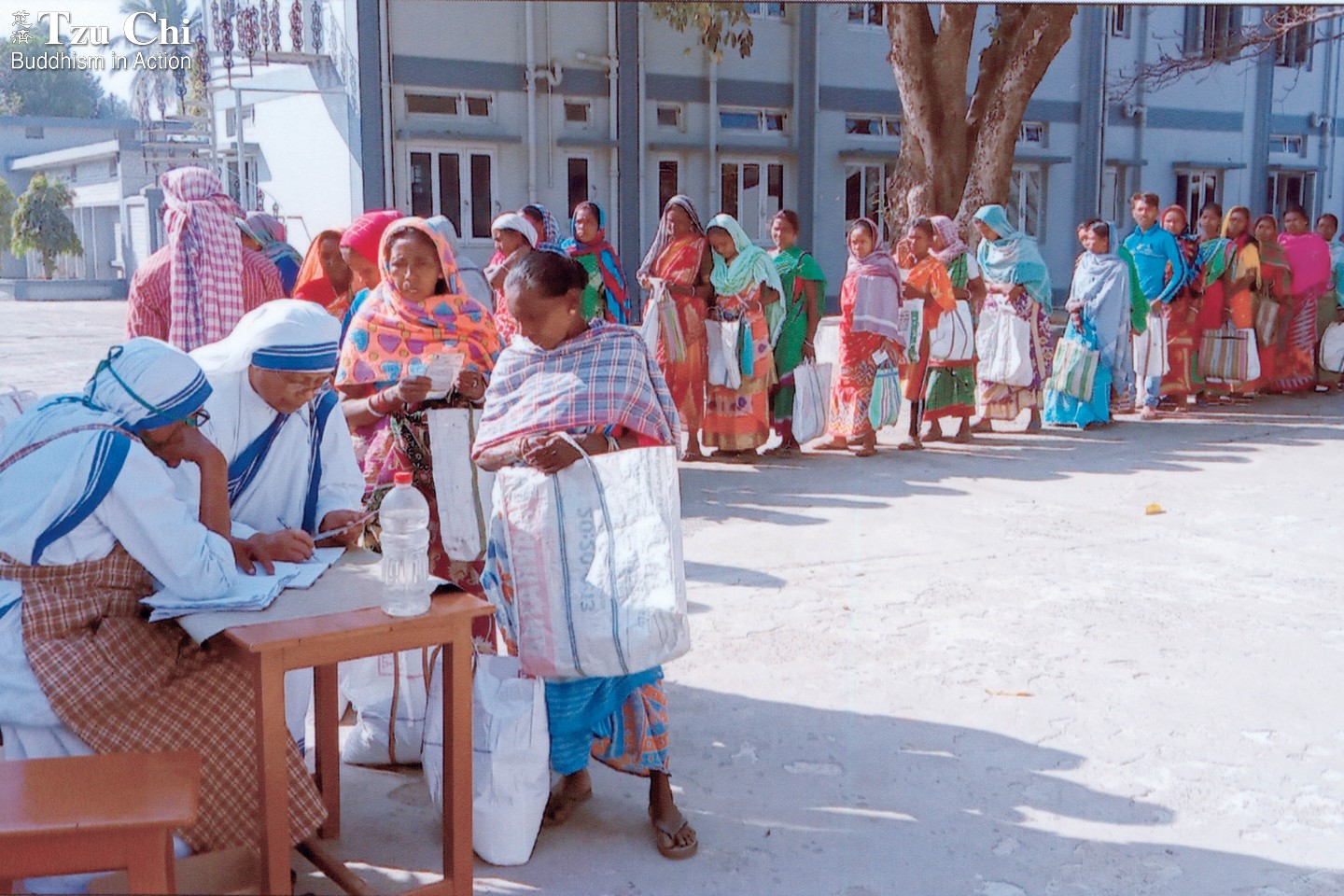
The Missionaries of Charity have been working with Tzu Chi to distribute daily necessities to help vulnerable people through the coronavirus crisis.

Four hundred underserved families in Mysore, Karnataka, India, received Tzu Chi-donated daily goods on January 27, 2021.
Aid to Nepal
One of the countries adversely impacted by India’s latest COVID-19 outbreak was Nepal, which borders India on three sides. With a population of about 30 million, Nepal recorded a daily average of over 5,000 COVID cases in May 2021, accompanied by a rapidly climbing death toll. A major reason for this surge was that many Nepalese had traveled to India earlier to attend Kumbh Mela, a major Hindu festival held every 12 years and believed to be the largest religious gathering on Earth. The Nepalese who went to India were believed to have brought back the virus that caused the surge of infections in their own country. The rapid spread of the disease in Nepal raised concerns that their outbreak might mimic India’s.
In early May, Tzu Chi received a request from Tribhuvan University Teaching Hospital (TUTH) in Nepal for medical equipment and supplies. The university was in desperate need. After days of work that included inquiring about prices and arranging for transportation, five ventilators and 70,000 medical gloves arrived at the healthcare institution. The hospital thanked Tzu Chi for its generous donation and said that the ventilators had already been used to save the lives of several patients.
In addition to donating medical equipment and supplies to TUTH and other institutions in Nepal, the foundation also asked local Tzu Chi volunteers to check and confirm some local needs. “Sister Qiu Yang [邱揚] purchased needed medical equipment in Kathmandu, the nation’s capital, and delivered it to the remote Manang District Hospital,” explained Liu Jin-kuan (劉勁寬), a Tzu Chi staffer at the foundation’s headquarters in Hualien. “It was a difficult journey, lasting 17 hours.” The trip was challenging because it involved travel across mountainous terrain. Happily, the shipment of supplies, including oxygen concentration equipment, oximeters, and infrared thermometers, arrived safely at the hospital on May 19.
The equipment donated to Manang District Hospital was purchased in Nepal. However, the country didn’t have a well-developed manufacturing industry, so most of the medical supplies and equipment the country needed had to be imported from abroad. Given the circumstances, Tzu Chi volunteers in China, “the world’s factory,” were given the responsibility of purchasing needed equipment for Nepal and arranging for its transportation.
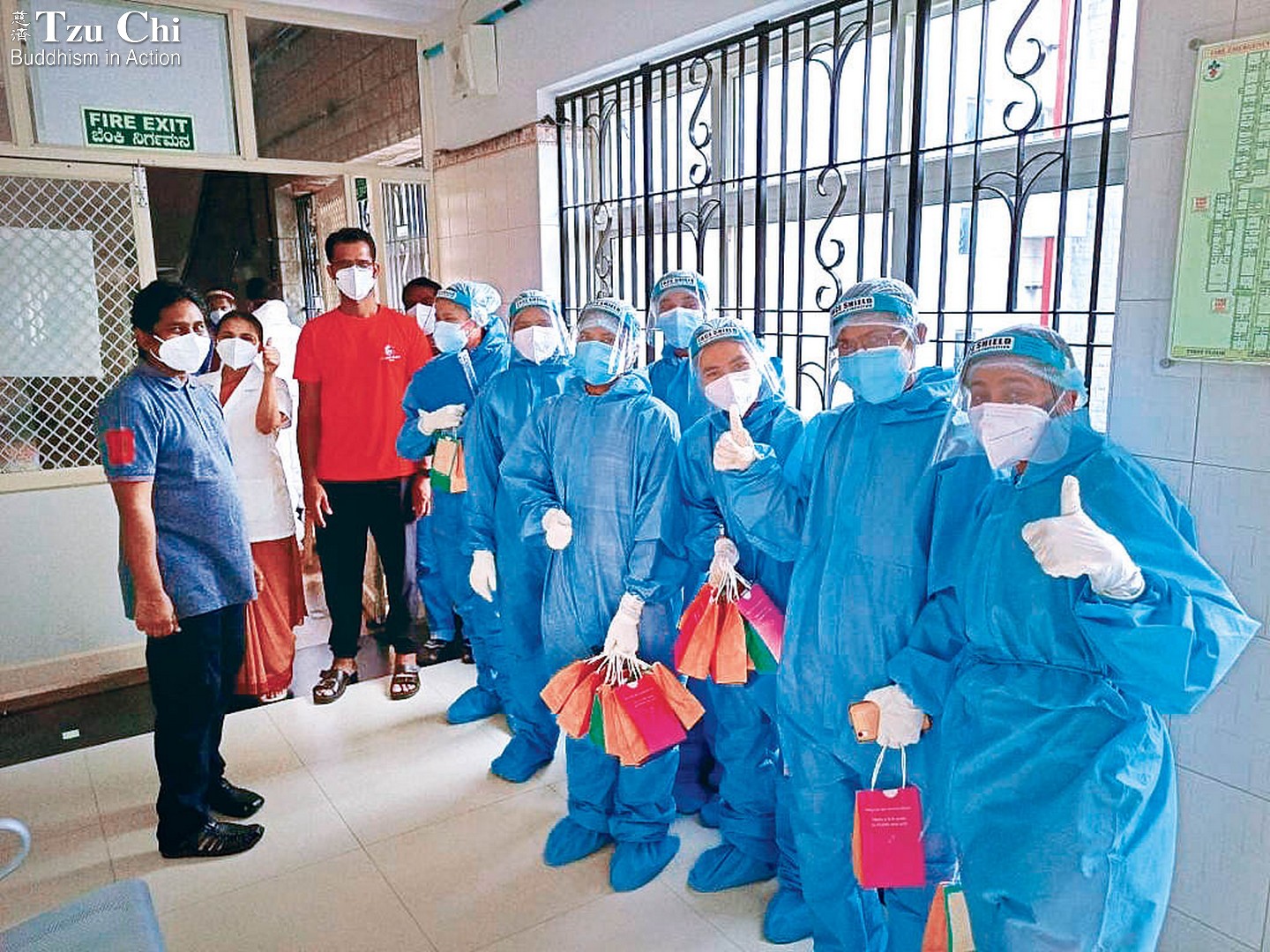
Camillian priests and nuns volunteered to go into hospitals to serve patients after India was hit by a second coronavirus wave this year.
Determined to deliver
The first chartered plane carrying Tzu Chi-donated supplies and equipment for Nepal took off from Lanzhou, northwest China, on May 24, but the goods on that flight had been manufactured 2,000 kilometers (1,240 miles) away, in Kunshan, near Shanghai. Volunteers in Kunshan had been entrusted with the assignment of escorting the shipment to Lanzhou.
“The elevators at the logistics company in charge of the delivery were broken when we were loading the supplies and equipment onto trucks to be delivered to Lanzhou,” said Liu Jin-kuan. “There were over one hundred boxes. Our volunteers had to move the supplies, one box at a time, from the third floor to the first to be loaded onto the trucks.”
When the volunteers accompanied the shipment to Lanzhou, they encountered another unexpected situation. They were told that due to the pandemic, the chartered plane couldn’t fly directly over the Qinghai–Tibet Plateau to Nepal as scheduled. Instead, the plane had to land in Cambodia first and be sanitized before it could fly over to Nepal. After that first plane had completed its mission, all the following chartered planes—seven in all—followed this “direct flight with stopover” flight plan. Even though the plan wasn’t as smooth as first envisioned, Liu Jin-kuan reflected, “As long as any channel remains open that allows us to get our aid into Nepal, we’re grateful.”
By mid-June, the aid from Tzu Chi, including life-saving oxygen concentrators, had reached 39 religious, medical, and charitable institutions in Nepal’s seven provinces. This was possible only with the help of Tzu Chi volunteers in Nepal, Nepal’s Ministry of Health and Population, and various other organizations. And it wasn’t just hospitals in urban areas that would benefit—volunteers planned to deliver equipment and supplies to health stations in outlying areas unreachable by car too.
Deputy CEO Simon Shyong talked about the difficulties that might be involved in such delivery trips, using Manang District as an example. “Manang District is located at an elevation of over 3,000 meters [9,840 feet] above sea level; the hospital there that received our aid in May sits at 4,200 meters [13,780 feet]. When they received the medical equipment we donated on May 19, they had planned to deliver some of the items to even higher places with the help of donkeys.” However, the plan to transport the items to five more outlying villages with donkeys was derailed by days of rain and a magnitude 5.8 earthquake that hit central Nepal on May 19. The quake and rain affected the road conditions. In the end, porters were employed to deliver the supplies to their destinations. Shyong summed up their herculean efforts to get the supplies out: “No matter how arduous the roads are, or how high a place is, we and the organizations that work with us are determined to beat all odds to accomplish our delivery missions.”
Aid to the Buddha’s birthplace
The aforementioned aid was provided to Nepal in May and June this year, but Tzu Chi’s help had begun even earlier than that. The foundation sent anti-coronavirus supplies to the nation last year. And in January 2021, the foundation started offering a work relief program in Lumbini, the Buddha’s birthplace, to help people in the area get through the pandemic.
The program, a joint effort between Tzu Chi and the International Buddhist Society in Lumbini, pays local women to make cloth face masks for schoolteachers and students. The program serves a dual purpose: participating women earn some income to help them get by, and students and teachers receive some basic protection against the coronavirus.
Just as Tzu Chi started 55 years ago with the help of 30 housewives, Venerable Bhikkhu Maitri, head of the International Buddhist Society, launched the mask-making project by engaging the services of 33 women. After they had been trained, they quickly got up to speed and made 20,000 masks in just 12 days. If each recipient received two masks each, that was enough masks to benefit 10,000 people.
With the program off to a good start, Bhikkhu Maitri decided to expand the project from one district to three by late April. But before he could do so, “the pandemic rates started shooting up,” said Liu Jin-kuan, “forcing the government to impose a lockdown. The 96 project participants could no longer gather at community centers to work. Instead, Bhikkhu Maitri had the sewing machines delivered to the homes of the women so that they could continue sewing masks.” Liu said that though the participants were able to keep up their sewing work at home, the schools were closed after the lockdown measures were implemented, so the masks they made were donated instead to law enforcement agencies.
From late April to May, Bhikkhu Maitri supplied more than 20,000 cloth masks made by the women and Tzu Chi-donated face shields, gloves, disinfectant, and other similar items to eight government and private organizations, including the police department in Lumbini.
In early May, the Lumbini city government made an appeal to Tzu Chi for hospital beds, ECG (electrocardiography) equipment, and other medical devices for an isolation facility. The Tzu Chi personnel in Hualien who handled this request for help couldn’t understand why an isolation facility would need hospital-grade equipment, so they asked Bhikkhu Maitri to help the foundation further understand the situation. After making inquiries, he reported back to the Tzu Chi personnel that the isolation center would continue to operate after the pandemic as a healthcare institution. The Tzu Chi staffers then consulted with professionals, including Dr. Lin Chin-lon, before deciding to help equip the isolation facility. To speed things up, Bhikkhu Maitri temporarily shifted money from the mask-making project to help pay for the required equipment.
Thanks to Bhikkhu Maitri’s help, Tzu Chi has been able to implement its COVID aid to Lumbini more smoothly and efficiently. The Buddhist monk’s connection with Tzu Chi isn’t recent, however. He said that he had visited Tzu Chi in Taiwan 30 years ago, when he came to the island to attend an international Buddhist youth event. In 2015, when a major earthquake hit Nepal, he also had the opportunity to get to know some Tzu Chi volunteers from Taiwan and Malaysia who were visiting his country to carry out relief work after the temblor. His connection with Tzu Chi, spanning decades, bears witness to this saying by Master Cheng Yen: “It is never too late for a deep-rooted karmic affinity to blossom.”
●
On May 3, the team at the Tzu Chi Hualien headquarters in charge of organizing the foundation’s COVID aid to India, Nepal, and the five other countries started holding daily meetings to confirm the medical items that were badly needed and the numbers required. The team also held online meetings every evening with various organizations in India and Nepal to understand how things were going in their countries and discuss aid related matters. Despite challenges presented by lockdowns and suspended flights, foundation staffers and volunteers worked hard to get life-saving supplies and equipment to the front lines.
Due to the implementation of lockdowns and vaccination plans, the pandemic situations in India and Nepal have fortunately started to improve in June. However, many people are still bearing the brunt of COVID-19. Tzu Chi’s aid projects are therefore still on-going. Volunteers and staffers in China, Indonesia, Malaysia, and Singapore have continued to purchase needed items and transport them to countries in need.
Regarding Tzu Chi’s aid to India and the other countries, Master Cheng Yen instructed volunteers to move quickly and enlist all necessary assistance to allow the foundation’s aid to reach those countries as soon as possible. With everyone’s combined efforts, the aid provided by Tzu Chi is bearing fruit. The equipment the foundation donated to various medical institutions has helped relieve their oxygen shortages, and protective gear supplied by Tzu Chi has also helped shield many front-line workers from COVID-19. All this wouldn’t have been possible without the love and help of many people.
